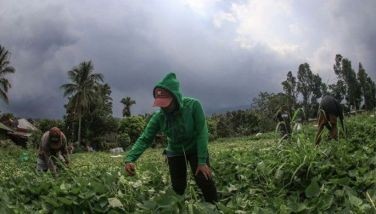Defense chief downplays British travel advisory
October 19, 2006 | 12:00am
Defense Secretary Avelino Cruz downplayed a travel advisory issued by the British government warning its citizens against traveling to the Philippines.
He assured the public that security forces are on their toes and emphasized that the threat of terrorism is worldwide.
"We’ve been in the worst situation (terrorism), and we’ve been able to manage," he said. "Travel advisories are everywhere. The threat of terrorism is part of the people’s lives, not only in the Philippines, but in other countries as well."
On Tuesday, Britain warned its citizens in the Philippines against traveling to Mindanao and to keep vigilant when in other parts of the country, including Metro Manila.
The British advisory included a warning that terrorists in the south may be "in the final stages of planning further attacks."
Cruz said troops are running after the Abu Sayyaf and the Jemaah Islamiyah in the island province of Sulu to thwart possible attacks. "The pursuit operations are ongoing so they won’t be able to regroup and plan."
Abu Sayyaf chieftain Khadaffy Janjalani and Jemaah Islamiyah bomb experts Dulmatin and Umar Patek, the alleged brains of the 2002 Bali, Indonesia bombings, have been the subject of a two-month-old manhunt in Sulu.
Four bombs rocked Central and Western Mindanao since last week, leaving eight people dead and scores wounded.
Another bomb attack was foiled following early discovery and seizure by the police of a powerful explosive planted in a public market in Pagadian City early last Sunday morning.
Military and police troops are still hunting down a group of Jemaah Islamiyah-trained bombers believed out to stage attacks in the south.
Security forces have also tightened watch in Metro Manila to thwart possible attacks.
The Australian, New Zealand and US embassies had cautioned against travel to Mindanao shortly before the attacks, citing credible information that terrorists could strike.
The British travel advisory warned that "there is a high threat from terrorism throughout the Philippines and the British government continue to receive reports that terrorist groups are planning further attacks and believe that they have the capacity and the intent to mount indiscriminate attacks at any time and anywhere in the country."
It added there was the risk of kidnappings of foreigners in resorts and terrorist attacks "to all forms of public transport: road, rail, sea and air."
Both the Abu Sayyaf and Jemaah Islamiyah are linked to Osama bin Laden’s al-Qaeda network.
The Abu Sayyaf group, on a US terrorist list, is notorious for ransom kidnappings, beheadings and bombings, including a February 2004 attack that gutted a ferry in Manila Bay and killed 116 people in one of Southeast Asia’s worst terrorist attacks.
He assured the public that security forces are on their toes and emphasized that the threat of terrorism is worldwide.
"We’ve been in the worst situation (terrorism), and we’ve been able to manage," he said. "Travel advisories are everywhere. The threat of terrorism is part of the people’s lives, not only in the Philippines, but in other countries as well."
On Tuesday, Britain warned its citizens in the Philippines against traveling to Mindanao and to keep vigilant when in other parts of the country, including Metro Manila.
The British advisory included a warning that terrorists in the south may be "in the final stages of planning further attacks."
Cruz said troops are running after the Abu Sayyaf and the Jemaah Islamiyah in the island province of Sulu to thwart possible attacks. "The pursuit operations are ongoing so they won’t be able to regroup and plan."
Abu Sayyaf chieftain Khadaffy Janjalani and Jemaah Islamiyah bomb experts Dulmatin and Umar Patek, the alleged brains of the 2002 Bali, Indonesia bombings, have been the subject of a two-month-old manhunt in Sulu.
Four bombs rocked Central and Western Mindanao since last week, leaving eight people dead and scores wounded.
Another bomb attack was foiled following early discovery and seizure by the police of a powerful explosive planted in a public market in Pagadian City early last Sunday morning.
Military and police troops are still hunting down a group of Jemaah Islamiyah-trained bombers believed out to stage attacks in the south.
Security forces have also tightened watch in Metro Manila to thwart possible attacks.
The Australian, New Zealand and US embassies had cautioned against travel to Mindanao shortly before the attacks, citing credible information that terrorists could strike.
The British travel advisory warned that "there is a high threat from terrorism throughout the Philippines and the British government continue to receive reports that terrorist groups are planning further attacks and believe that they have the capacity and the intent to mount indiscriminate attacks at any time and anywhere in the country."
It added there was the risk of kidnappings of foreigners in resorts and terrorist attacks "to all forms of public transport: road, rail, sea and air."
Both the Abu Sayyaf and Jemaah Islamiyah are linked to Osama bin Laden’s al-Qaeda network.
The Abu Sayyaf group, on a US terrorist list, is notorious for ransom kidnappings, beheadings and bombings, including a February 2004 attack that gutted a ferry in Manila Bay and killed 116 people in one of Southeast Asia’s worst terrorist attacks.
BrandSpace Articles
<
>
- Latest
- Trending
Trending
Latest
Trending
Latest
Recommended






























